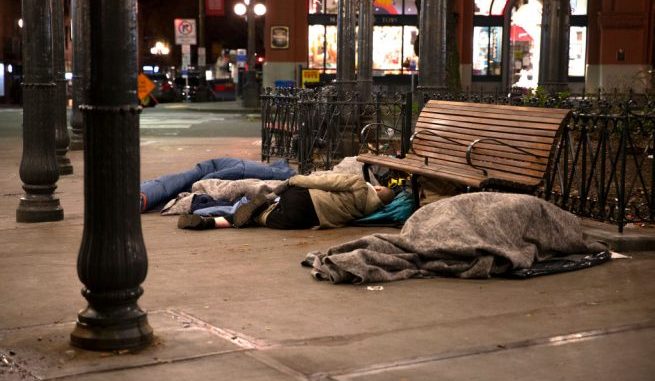

People sleep outside on a sidewalk on April 6, 2020 in Seattle, Washington. The City of Seattle and King County are in the process of minimizing the concentration of people living in shelters in response to the coronavirus (COVID-19) outbreak, particularly for people experiencing homelessness and those who cannot safely quarantine in their own homes. They’re temporarily adding over a thousand beds in other places and increasing the distance of all beds between people. (Photo by Karen Ducey/Getty Images)
OAN Newsroom
UPDATED 12:40 PM PT – Sunday, December 13, 2020
The Seattle City Council is weighing a new criminal code regulation that would excuse many misdemeanors.
Under the proposal, council members considered excusing misdemeanor crimes, including assault, if the crime is linked to poverty, addiction or a mental disorder. The proposal excluded those related to domestic violence and impaired driving.

SEATTLE, WA – APRIL 06: A man sleeps in a doorway on April 6, 2020 in Seattle, Washington. The City of Seattle and King County are in the process of minimizing the concentration of people living in shelters in response to the coronavirus (COVID-19) outbreak, particularly for people experiencing homelessness and those who cannot safely quarantine in their own homes. Theyre temporarily adding over a thousand beds in other places and increasing the distance of all beds between people. (Photo by Karen Ducey/Getty Images)
Members have claimed, “the current system isn’t working for both offenders and victims.”
“In a situation where you took that sandwich because you were hungry and you were trying to meet your basic need of satisfying your hunger; we as the community will know that we should not punish that,” King County Director of Public Defense Anita Khandelwal said. “That conduct is excused.”

SEATTLE, WA – MAY 06: Personal hygiene supplies for clients are pictured in the Co-LEAD program offices on May 6, 2020 in Seattle, Washington. Co-LEAD grew from the Law Enforcement Assisted Diversion (LEAD) program to respond to the COVID-19 pandemic by keeping low level criminals and the homeless out of jails, while providing temporary lodging at hotels, deploying intensive outreach responders, and providing other basic resources including medical care and case managers. (Photo by David Ryder/Getty Images)
Meanwhile, many law enforcement officers have quit at high rates, noting the profession has lost much of its respect. The council said it will continue to work on the proposal in 2021.





Be the first to comment